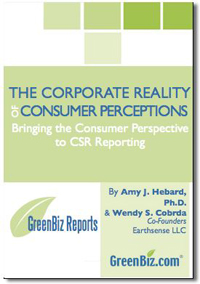Bringing the Consumer Perspective to CSR Reporting
 What do companies such as Whole Foods, Burt’s Bees and Lowe’s have that corporate America craves? According to consumers: eco-sensibility.
What do companies such as Whole Foods, Burt’s Bees and Lowe’s have that corporate America craves? According to consumers: eco-sensibility.Consumers believe that when they support companies like these, they do more than just shop. They align themselves with businesses that do good things for the environment. This green paper provides research findings from the Earthsense Eco-Insights Survey on how consumers perceive corporate environmental responsibility. Findings are based on Earthsense Business Indicator (EBI) metrics that identify companies which consumers see as sustainability leaders. They also identify the businesses consumers support based on eco-friendly products, and they track changes in perceptions over time.
The impact of consumer perception on corporate reality is clear: if consumers don’t know about corporations’ sustainability initiatives, those efforts will not be fully realized.
Background
Before the recent economic downturn, the burgeoning green market seemed limitless. With an occasional blind eye to the size of consumers’ wallets, manufacturers churned out a slew of eco-friendly, ―green, environmentally responsible (fill in your favorite green term) products, many at premium prices. And consumers ate them up, put them on, and drove them around.
At the same time, another trend was on an upward swing – growth in CSR reporting (Corporate Social Responsibility) by major corporations. Auditing firm KPMG reported a 30 percent jump from 2005 to 2008 in the percentage of large companies generating CSR reports; four out of five (79%) of the world’s largest companies now provide this information in a publicly available form.
A key driver of this growth, according to Judy Henderson of the Global Reporting Initiative, is that, ―More than ever, employees, investors and consumers are looking to the companies from which they buy, invest in, and work for to join them in addressing the critical sustainability issues of the day in innovative ways.
There is a disconnect, however. Many CSR metrics measure things we can see and touch: the composition of products we buy (e.g., % of recycled content); manufacturing plants’ energy consumption (e.g., amount saved); waste reduction (e.g., amounts of water or emissions discharges). Rife with rich statistics, many CSR reports take a multi-dimensional approach that is as incomplete as an eight-cell Rubik’s cube.
As the consumer marketplace has become ever-greener and consumers’ expectations of companies ever higher, a surprising gap is evident, in that a key stakeholder often is missing. The consumer.
The green movement is part of the larger framework of Corporate Social Responsibility, which takes into account a wide variety of factors that make companies successful, while also taking responsibility for their effect on the earth. Measures of progress, as part of a company’s overall sustainability strategy, are crucial arrows in the CSR quiver. With an eye toward closing this gap, Earthsense – an applied marketing and research firm headquartered in upstate New York – has created the Earthsense Business Indicator, a set of metrics from the consumer point of view to help companies understand the marketplace perspective.
These measures are founded on an old business adage. "Unless you measure it, you can’t manage it. If you can’t manage it, you can’t improve it." Which begs the question – How do companies know that their efforts are resonating with the very people who drive their revenue – consumers?
In the corporate world, perception is reality. And consumer perception – assuming you are on their radar – drives both boycotting and ―buycotting" and, in these days of modern activism, positive and negative commentary on the web. How is it then, for many if not most, such a key stakeholder is missing in action from companies’ CSR measures?
You can download the full report from GreenBiz.com [PDF].
You can return to the main Market News page, or press the Back button on your browser.

